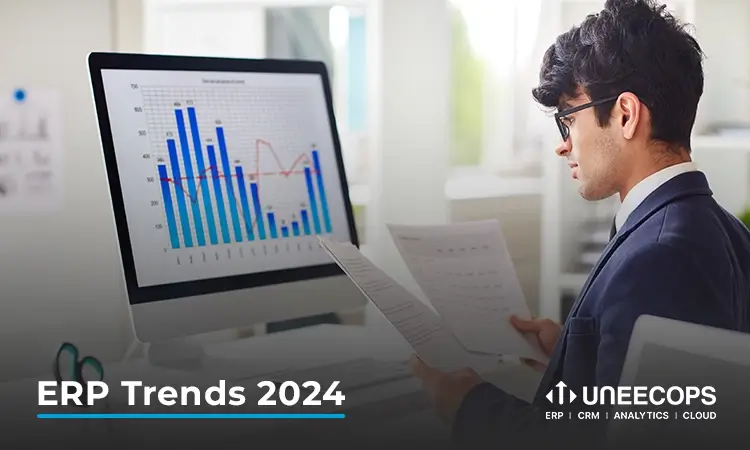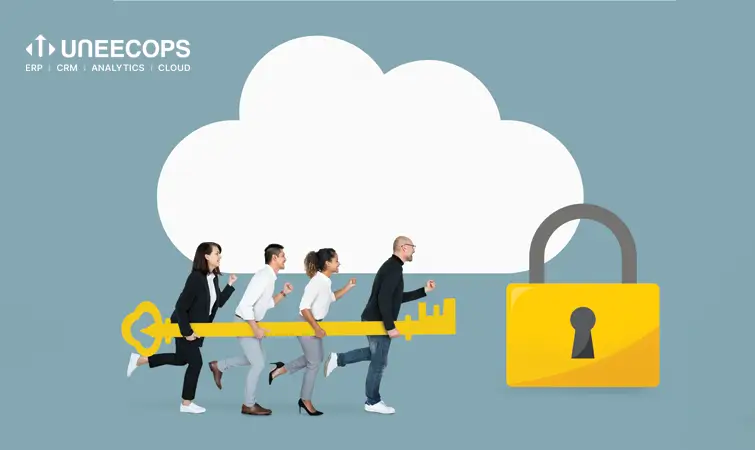As we approach 2024, several emerging trends are set to reshape the future of ERP systems. Through this blog, we will discover the trends and their impact on businesses across various industries. From the integration of artificial intelligence (AI) and machine learning to the growing importance of sustainability and the environment, let’s dive into the exciting world of ERP trends.
Cloud Computing: Embracing Flexibility and Scalability
One of the most significant ERP trends 2024 is the increasing adoption of cloud computing. Cloud computing provides businesses with on-demand access to computing resources such as storage, processing power, and applications. This means that businesses can scale up or down as and when needed, without having to invest in expensive hardware or software. When it comes to ERP software, cloud computing allows businesses to access it and its data from anywhere, on any device at any time. The rental model of cloud-based ERP also provides cost effectiveness, eliminating the need for heavy spending on expensive machines.
AI and Machine Learning Integration: Empowering Decision-Making
By harnessing the power of advanced algorithms, ERP software can analyze vast amounts of data, enabling more informed decision-making. AI can automate repetitive tasks, saving employees valuable time and increasing productivity. In addition, AI-driven analysis of inventory levels and availability can provide recommendations for reordering and storage, optimizing supply chain management.
IoT Integration: Revolutionizing and Improvising Growth
The Internet of Things (IoT) is bringing a transformation within the ERP systems by connecting physical objects to the digital space. In 2024, future trends in ERP are expected to integrate the system with IoT infrastructures, allowing real-time monitoring of production processes and inventory levels. E.g., IoT integration can enable predictive maintenance in manufacturing, reducing downtime and improving operational efficiency. In retail, IoT sensors can track product movement, optimizing inventory and minimizing waste.
Sustainability and Environmental Considerations: A Growing Focus
ERP software is integrating sustainable processes to reduce resource consumption, minimize waste, and promote responsible practices. Shorter delivery routes, lower power consumption, and improved product traceability are becoming key considerations in ERP systems.
Business Intelligence : Governing With Informed Decision Making
With robust data analytics capabilities, ERP systems can track key performance indicators (KPIs), identify opportunities for improvement, and predict future trends. For example, retail ERP solutions offer the ability to analyze customer buying trends, facilitating focused marketing initiatives and tailored suggestions for goods.
Enhanced Mobile Accessibility: Empowering Remote Work
In 2024, future trends in ERP systems will also include optimization of their interfaces for seamless experiences on smartphones and tablets. Mobile ERP apps enable users to retrieve sensitive information at any place and time. Field officers can modify the status of tasks, sales teams can retrieve user details, and warehouse managers can monitor stock levels, directly from the palm of their hands.
Enhanced UX: Streamlining Workflows
In 2024, we will also see ERP software trends, as the vendors will focus on enhancing the overall User Experience (UX) by simplifying workflows and providing customizable dashboards. By improving the structure and intuitiveness of the software, businesses can reduce the training period for their employees and bring an increment in the potential for experienced ones.
Cybersecurity: Safeguarding Critical Data
With the rise in electronic data exchange and networking, ERP systems are implementing robust security measures to combat threats. By prioritizing cybersecurity, businesses can safeguard critical data and maintain trust with their customers.
Compliance and Data Protection: Adhering to Regulations
Laws and regulations are constantly evolving, and businesses must ensure that their ERP solutions adhere to the latest guidelines. By implementing ERP systems that prioritize compliance and data protection, businesses can operate securely and avoid legal complications. This trend will continue to shape ERP systems in 2024 and beyond.
Blockchain Technologies: Enhancing Security and Transparency
By integrating blockchain into ERP, businesses can enhance security and transparency in transactions. In ERP technology trends, we will observe Cryptographic algorithms being used to ensure data integrity and prevent manipulation, making blockchain a powerful tool for ensuring the authenticity and traceability of transactions or movement of goods, fostering trust and reducing fraud.
Industry-Specific Solutions: Tailoring ERP to Unique Needs
In 2024, ERP vendors will offer tailored solutions for various sectors, such as healthcare, construction, and agriculture. These industry-specific ERP systems will come preconfigured with functionalities and modules that cater to the specific needs of each industry.
The Future of ERP: Agility, Innovation, and Growth
As we look ahead to 2024, ERP systems are poised for exciting changes. The trends in 2024 and beyond will revolutionize how businesses operate, making them more agile, data-driven, and responsive to market changes. Whether it’s leveraging AI for intelligent decision-making, harnessing the power of the cloud for scalability, or integrating IoT to optimize processes, ERP systems are evolving to meet the needs of modern businesses. These are just some of the trends that will shape the future of ERP systems. By embracing these trends, organizations can stay ahead of the curve, drive innovation, and bring exponential growth for their ventures.







